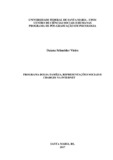| dc.creator | Vieira, Daiana Schneider | |
| dc.date.accessioned | 2019-09-16T19:52:45Z | |
| dc.date.available | 2019-09-16T19:52:45Z | |
| dc.date.issued | 2017-05-05 | |
| dc.identifier.uri | http://repositorio.ufsm.br/handle/1/18234 | |
| dc.description.abstract | This Master's thesis aimed to identify and problematize the knowledge built around the Bolsa Família Program (BFP). For that, we elaborated two papers: "Social Representations in editorial cartoons about 'Bolsa Família': what do the beneficiaries tell us about it?", and "Let's talk about Bolsa Família? The dialogue among teaching, research and extension". In the first paper, we aimed to analyze how female beneficiaries represent the BFP and if there may be identifications and significations of their experiences with the social program. The empirical research was conducted through epistemology circles involving nine female beneficiaries of BFP, linked to a CRAS (Reference Center for Social Assistance) from a city in RS. The analysis is based on the epistemological perspective of Critical Social Psychology and the Theory of Social Representations, and it also uses the theoretical concepts of ideology, in its critical sense, and hyper-representations. The study pointed that in most situations there was no signification and identification between the experiences of these women and the contents of the cartoons, which presented negative ideological hyper-representations about the BFP beneficiaries. In the situations in which there was some identification, it was because the cartoons referred to situations that were familiar to them through the mass media, but distant from them in time or space. In the second paper, we brought an experience report about the extension project "Empowering affectivity and criticism through art and dialogicality: the invisible lives or invisibilities of the health object", to which this thesis is linked. The project was carried out during 2015 and 2016, simultaneously to the period of the master's degree. The report was divided into three parts: (a) Studying about Bolsa Família and cinema, (b) Rehearsing for the documentary, and c) Presenting the extension activity. We concluded that the activities related to the extension project enabled important experiences that contributed to improve the research topic. We highlight the importance of interdisciplinary work and the use of documentary films to work and (re)think social issues, such as the Bolsa Família Program, under the light of Critical Social Psychology and the Theory of Social Representations. | eng |
| dc.language | por | por |
| dc.publisher | Universidade Federal de Santa Maria | por |
| dc.rights | Attribution-NonCommercial-NoDerivatives 4.0 International | * |
| dc.rights.uri | http://creativecommons.org/licenses/by-nc-nd/4.0/ | * |
| dc.subject | Psicologia social | por |
| dc.subject | Representações sociais | por |
| dc.subject | Charges | por |
| dc.subject | Programa Bolsa Família | por |
| dc.subject | Social psychology | eng |
| dc.subject | Social representations | eng |
| dc.subject | Editorial cartoons | eng |
| dc.subject | Bolsa Familia Program | eng |
| dc.title | Programa Bolsa Família, representações sociais e charges na internet | por |
| dc.title.alternative | Bolsa Familia Program, social representations and editorial cartoons on the internet | eng |
| dc.type | Dissertação | por |
| dc.description.resumo | Esta dissertação teve como objetivo identificar e problematizar os saberes construídos em relação ao Programa Bolsa Família (PBF). Para tanto, elaboramos dois artigos: “Representações Sociais nas charges do ‘Bolsa Família’: o que nos dizem as beneficiárias sobre isso?” e “Vamos falar sobre o Bolsa Família? A interlocução entre ensino, pesquisa e extensão”. No primeiro artigo objetivamos analisar como mulheres beneficiárias representam o PBF e se charges do PBF possibilitam identificações e significações de suas vivências para com o programa social. A pesquisa empírica foi realizada por meio de círculos epistemológicos em que participaram nove mulheres beneficiárias do PBF, vinculadas a um CRAS de uma cidade do interior do RS. Para a análise, sustentamo-nos na perspectiva epistemológica da Psicologia Social Crítica e da Teoria das Representações Sociais, recorrendo também aos operadores teóricos ideologia, no sentido crítico, e hiper-representações. Por meio do estudo foi possível perceber que, na maioria das situações, não houve significação e identificação entre as vivências destas mulheres com o conteúdo das charges, as quais traziam hiper-representações de caráter ideológico e negativo acerca dos beneficiários do PBF. Nas situações em que houve algum tipo de identificação, foi porque as charges remeteram às situações conhecidas por meio dos meios de comunicação em massa, as quais estavam distantes geográfica ou temporalmente delas. No segundo artigo, trouxemos um relato de experiência acerca do projeto de extensão “Potencializando afetividade e crítica através da arte e da dialogicidade: das vidas invisíveis ou das invisibilidades do objeto saúde” ao qual esta dissertação está vinculada. O projeto foi realizado durante o ano de 2015 e 2016, período concomitante ao percurso do mestrado. O relato foi dividido em três partes: a) Estudando Bolsa Família e cinema, (b) Ensaiando para o documentário e (c) Apresentando a atividade de extensão. Concluímos que as atividades relacionadas ao projeto de extensão possibilitaram vivenciar importantes experiências que contribuíram para aprimorar o tema de pesquisa. Reafirmamos a importância do trabalho interdisciplinar e do uso do cinema documentário para trabalhar e (re)pensar temas de interesse social como o Programa Bolsa Família, por meio da Psicologia Social Crítica e da Teoria das Representações Sociais. | por |
| dc.contributor.advisor1 | Roso, Adriane | |
| dc.contributor.advisor1Lattes | http://lattes.cnpq.br/5781004524826262 | por |
| dc.contributor.referee1 | Accorssi, Aline | |
| dc.contributor.referee1Lattes | http://lattes.cnpq.br/7571571217332694 | por |
| dc.contributor.referee2 | Santos, Samara Silva dos | |
| dc.contributor.referee2Lattes | http://lattes.cnpq.br/1315602265197011 | por |
| dc.creator.Lattes | http://lattes.cnpq.br/6448637993987308 | por |
| dc.publisher.country | Brasil | por |
| dc.publisher.department | Psicologia | por |
| dc.publisher.initials | UFSM | por |
| dc.publisher.program | Programa de Pós-Graduação em Psicologia | por |
| dc.subject.cnpq | CNPQ::CIENCIAS HUMANAS::PSICOLOGIA | por |
| dc.publisher.unidade | Centro de Ciências Sociais e Humanas | por |



